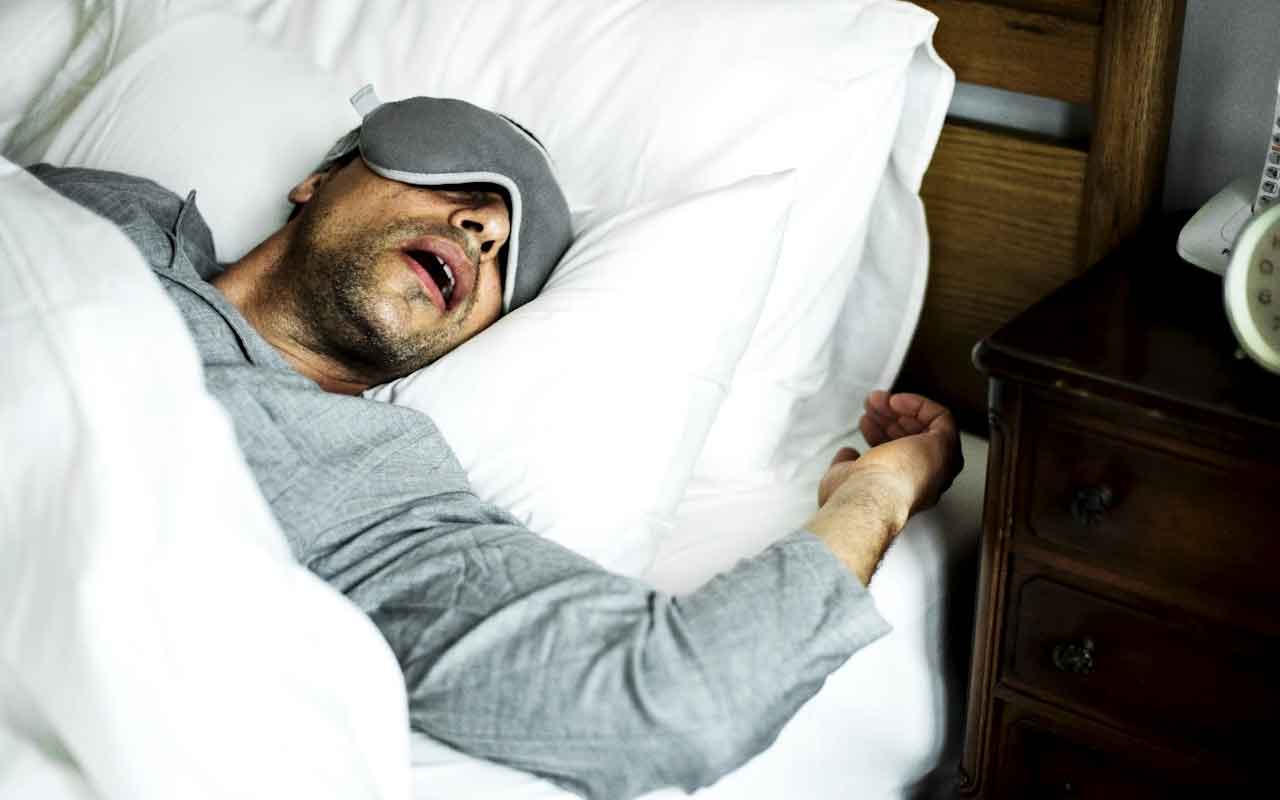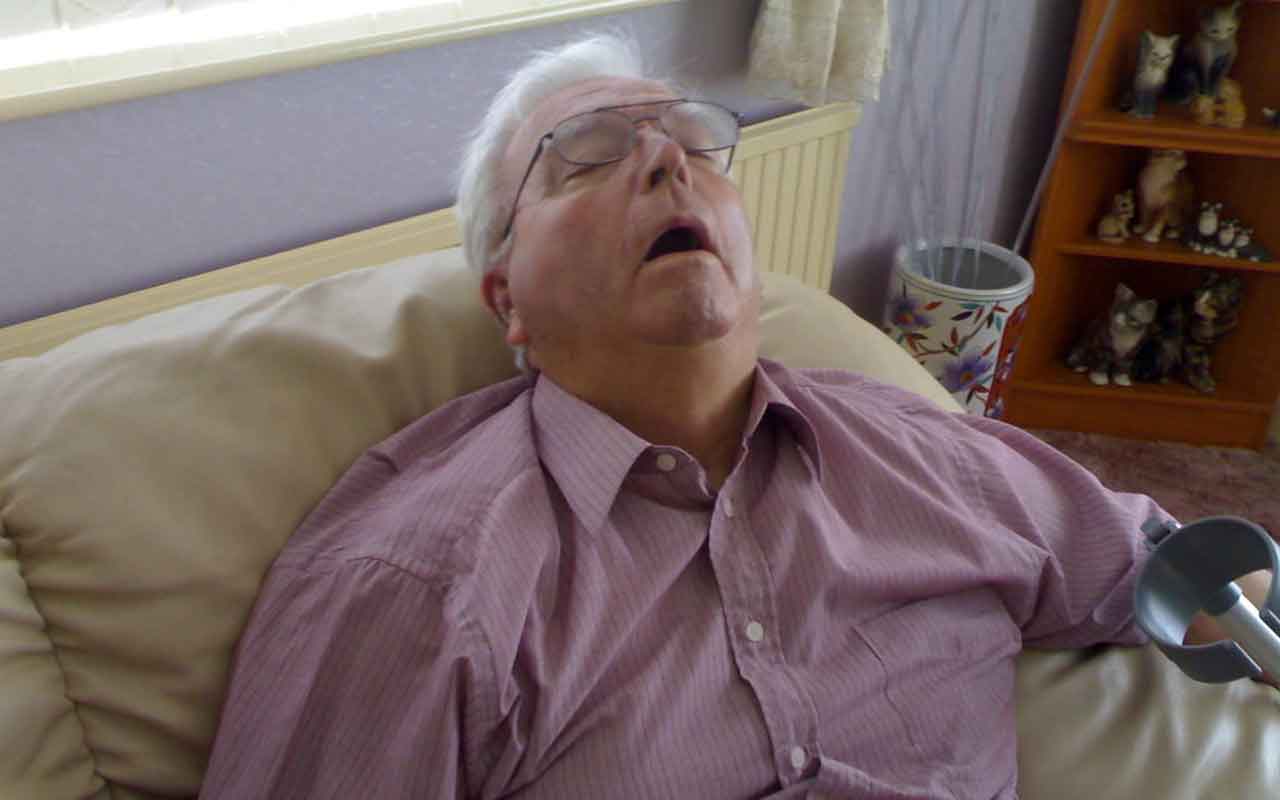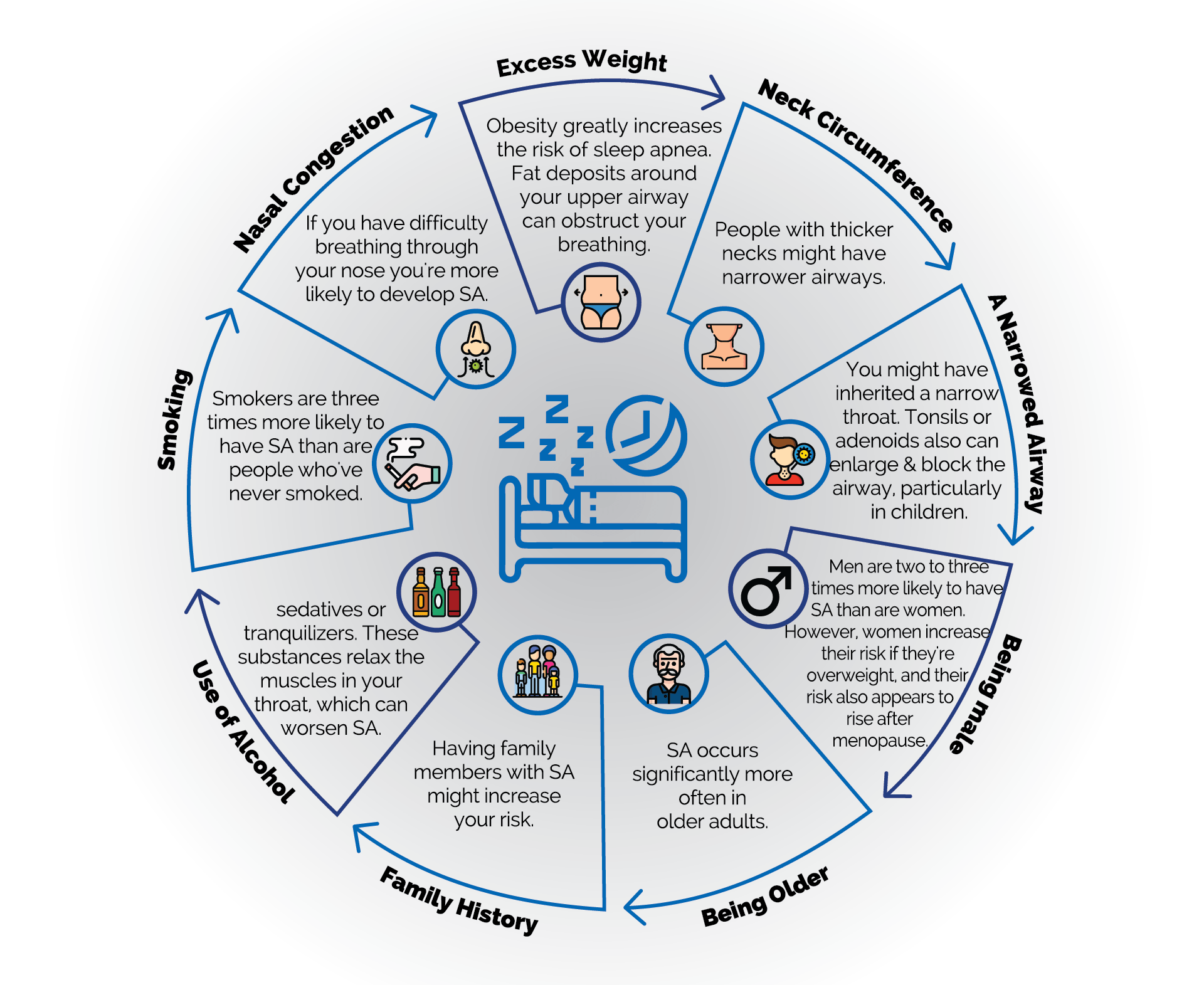Do you snore loudly and frequently? Do you feel tired and groggy during the day? Do you have trouble concentrating or remembering things? If you answered yes to any of these questions, you might be suffering from sleep apnea, a serious sleep disorder that affects millions of people worldwide.
Sleep apnea is a condition where your breathing stops or becomes shallow during sleep, causing you to wake up briefly and repeatedly throughout the night.
This disrupts your sleep quality and can lead to various health problems, such as high blood pressure, heart disease, stroke, diabetes, and depression.
In this article, we will explain the causes, symptoms, and treatment options for heavy snorers and sleep apnea patients.
We will also give you some tips on how to improve your sleep hygiene and lifestyle habits to prevent or reduce snoring and sleep apnea.
Table of Contents

Snoring is a loud or harsh sound that occurs when you breathe during sleep. It happens when the air you inhale passes through the relaxed tissues in your throat, causing them to vibrate.
Snoring can be influenced by various factors, such as your anatomy, your weight, your alcohol consumption, your sleeping position, and your nasal congestion.
Snoring is the vibration of tissues in the upper airway during sleep. It is caused by the partial obstruction of the airway, which can be due to a number of factors, including:
- Relaxed throat muscles
- A large tongue or uvula
- Excess weight
- Enlarged tonsils or adenoids
- A deviated septum
- Nasal congestion
Snoring is a common sign of sleep apnea, but not all snorers have sleep apnea. Sleep apnea is a serious sleep disorder that causes you to stop breathing or breathe very shallowly for short periods during sleep. This lowers the oxygen level in your blood and disrupts your sleep quality.
There are two main types of sleep apnea: obstructive and central. Obstructive sleep apnea (OSA) occurs when the airway is blocked by the soft tissues of the throat. Central sleep apnea (CSA) occurs when the brain does not send proper signals to the muscles that control breathing.
Snoring is very common, affecting about half of all adults at some point in their lives. It is usually harmless, but it can be a sign of a more serious sleep disorder, such as obstructive sleep apnea (OSA).
OSA is a condition in which breathing repeatedly stops and starts during sleep. It is caused by a complete or partial blockage of the upper airway. People with OSA often snore loudly and have other symptoms, such as:
- Excessive daytime sleepiness
- Witnessed breathing pauses during sleep
- Gasping or choking at night
- Morning headaches
- Difficulty concentrating
- Irritability
Snoring and sleep apnea are both associated with various health risks, such as high blood pressure, heart disease, stroke, diabetes, and depression.

Therefore, it is important to seek medical attention if you snore loudly and frequently, especially if you also have other symptoms of sleep apnea, such as daytime sleepiness, gasping or choking during sleep, morning headaches, or difficulty concentrating
What are the types and causes of sleep apnea?

There are three main types of sleep apnea: obstructive, central, and complex.
- Obstructive sleep apnea (OSA) is the most common type of sleep apnea. It occurs when the muscles in the back of the throat relax and block the airway, preventing air from reaching the lungs. OSA can be influenced by various factors, such as obesity, age, sex, anatomy of the throat and mouth, alcohol consumption, smoking, and nasal congestion. The most common causes of OSA include:
- Excess weight
- A large tongue or uvula
- Enlarged tonsils or adenoids
- A deviated septum
- Nasal congestion
- Smoking
- Alcohol use
- Certain medications
- Central sleep apnea (CSA) is a less common type of sleep apnea. It occurs when the brain fails to send signals to the muscles that control breathing, resulting in pauses or irregularities in breathing. CSA can be caused by conditions that affect the brainstem, such as stroke, brain tumor, infection, or injury. It can also be associated with heart failure, kidney failure, Parkinson’s disease, Alzheimer’s disease, or opioid use. The most common causes of CSA include:
- Heart failure
- Stroke
- Parkinson’s disease
- Amyotrophic lateral sclerosis (ALS)
- Certain medications
- Complex sleep apnea syndrome (CSAS) is a rare type of sleep apnea. It occurs when a person has both OSA and CSA. It can happen when someone with OSA receives treatment with a continuous positive airway pressure (CPAP) machine, which delivers pressurized air through a mask to keep the airway open. However, instead of improving the breathing pattern, the CPAP machine triggers CSA in some cases.
What are the symptoms and complications of sleep apnea?
The symptoms and complications of sleep apnea can vary depending on the severity of the condition.
Symptoms of sleep apnea
The most common symptoms of sleep apnea include:
- Loud snoring: Snoring is a sign that the airway is partially blocked by the soft tissues of the throat. However, not all snorers have sleep apnea, and not all people with sleep apnea snore.
- Witnessed breathing pauses during sleep: These are called apneas, and they can last from a few seconds to a few minutes. They can occur 5 to 30 times or more per hour. Apneas can lower the oxygen level in the blood and cause the brain to wake you up briefly to restore normal breathing.
- Gasping or choking at night: These are called hypopneas, and they occur when the airway is partially blocked and the breathing becomes shallow. Hypopneas can also lower the oxygen level in the blood and cause the brain to wake you up briefly to restore normal breathing.
- Morning headaches: This can happen because of low oxygen levels in the blood or high carbon dioxide levels in the body due to poor breathing during sleep.
- Difficulty concentrating
- Irritability
- Awakening with a dry mouth or sore throat. This can happen because of mouth breathing or snoring during sleep
- Difficulty staying asleep, known as insomnia. This can happen because of frequent awakenings due to apneas or hypopneas, or because of discomfort or anxiety caused by snoring or gasping.
- Excessive daytime sleepiness: Excessive daytime sleepiness, is known as hypersomnia. This can happen because of poor sleep quality and quantity due to sleep apnea. Daytime sleepiness can affect your mood, concentration, memory, performance, and safety.
Complications of sleep apnea
Untreated sleep apnea can lead to a number of serious health problems, including:
- High blood pressure: Sleep apnea can cause sudden drops in blood oxygen levels, which can increase blood pressure and strain the cardiovascular system. Sleep apnea can also cause the release of stress hormones, which can raise blood pressure and heart rate.
- Heart disease: Sleep apnea can increase the risk of heart problems, such as irregular heartbeat, heart attack, heart failure, and stroke. This is because of the effects of low oxygen levels, high blood pressure, and stress hormones on the heart and blood vessels.
- Stroke
- Liver problems. Sleep apnea can affect how the liver functions and processes fats. Sleep apnea can cause liver inflammation, scarring, or fatty liver disease.
- Type 2 diabetes: Sleep apnea can affect how the body uses insulin, which is a hormone that regulates blood sugar levels. Sleep apnea can also cause insulin resistance, which means that the body does not respond well to insulin. This can lead to high blood sugar levels and diabetes.
- Depression: Sleep apnea can affect your mental health and well-being. Sleep apnea can cause mood changes, irritability, anxiety, and depression. This is because of the effects of poor sleep quality, daytime sleepiness, and low oxygen levels on the brain and nervous system.
- Anxiety
- Memory problems
- Obesity
- Work-related and traffic accidents
How is sleep apnea diagnosed and treated?
Sleep apnea is diagnosed through a sleep study, which is a test that monitors your breathing, heart rate, and brain activity while you sleep. The sleep study can be done at a sleep center or at home.
Diagnosis
During a sleep study, you will be hooked up to a number of sensors that will track your sleep. The sensors will monitor your:
- Breathing
- Heart rate
- Brain activity
- Oxygen levels in the blood
- Airflow through the nose and mouth
- Chest and abdominal movement
The sleep study results will be used to diagnose sleep apnea and determine the severity of the condition.
To diagnose sleep apnea, you may need to undergo a sleep study or a home sleep apnea test. A sleep study is a test that monitors your breathing and other body functions while you sleep at a sleep center.
A home sleep apnea test is a simplified version of the sleep study that you can do at your own home with a portable device.
These tests can measure your heart rate, blood oxygen level, airflow, and breathing patterns. They can also detect other sleep disorders that may affect your sleep quality.
Treatment
The most common treatment for sleep apnea is continuous positive airway pressure (CPAP). CPAP is a machine that delivers pressurized air through a mask worn over the nose or mouth. The air pressure keeps the upper airway open during sleep, preventing snoring and apneas.
Other treatments for sleep apnea include:
- Oral appliance therapy: Oral appliances are custom-made devices that fit over the teeth and reposition the jaw and tongue to keep the airway open during sleep.
- Surgery: Surgery may be an option for some people with OSA, but it is usually a last resort.
To treat sleep apnea, you may need to use a device that keeps your airway open during sleep, such as a continuous positive airway pressure (CPAP) machine.
A CPAP machine delivers pressurized air through a mask that you wear over your nose or mouth while you sleep. This prevents your airway from collapsing and improves your breathing.
CPAP is the most effective treatment for obstructive sleep apnea, but some people may find it uncomfortable or inconvenient.
Lifestyle changes
In addition to medical treatment, there are a number of lifestyle changes that can help to improve sleep apnea symptoms and reduce the risk of complications. These changes include:
- Losing weight
- Avoiding alcohol before bed
- Sleeping on your side
- Quitting smoking
- Getting regular exercise
If you have sleep apnea, it is important to work with your doctor to develop a treatment plan that is right for you. With proper treatment, most people with sleep apnea can live long and healthy lives.
Other treatment options for sleep apnea include lifestyle changes, oral appliances, surgery, or medications.
Lifestyle changes may include losing weight, quitting smoking, avoiding alcohol, sleeping on your side, or using nasal sprays or strips to clear your congestion.
Oral appliances are devices that fit in your mouth and adjust your jaw position to keep your airway open.
Surgery may involve removing excess tissue from your throat or nose, or implanting a device that stimulates the nerve that controls the tongue movement.
Medications may include supplements, antidepressants, or opioids to treat central sleep apnea or reduce snoring.
How to choose the right treatment for you
The best treatment for you will depend on the severity of your sleep apnea, your overall health, and your lifestyle.
If you have mild sleep apnea, your doctor may recommend lifestyle changes first. If lifestyle changes are not effective, or if you have moderate to severe sleep apnea, your doctor may recommend CPAP or oral appliance therapy.
Surgery is usually only recommended for people with severe sleep apnea who have not responded to other treatments.
It is important to talk to your doctor about the risks and benefits of each treatment option so that you can choose the one that is best for you.
How can you prevent or reduce snoring and sleep apnea?
There are a number of things you can do to prevent or reduce snoring and sleep apnea, including:
- Maintain a healthy weight. Excess weight is a major risk factor for snoring and sleep apnea. Losing weight can help to reduce the amount of tissue in the throat that can vibrate and cause snoring.
- Avoid alcohol and tobacco before bed. Alcohol and tobacco can relax the muscles in the throat, which can make snoring and sleep apnea worse.
- Sleep on your side. Sleeping on your back can cause the tongue to fall back and block the airway, which can lead to snoring and sleep apnea. Sleeping on your side can help to keep the airway open.
- Get regular exercise. Exercise can help to strengthen the muscles in the throat and reduce the amount of fat in the neck, both of which can help to reduce snoring and sleep apnea.
- Use a nasal strip or dilator to open up your nostrils. If you have nasal congestion or obstruction, you may breathe through your mouth instead of your nose, which can increase snoring and sleep apnea. Using a nasal strip or dilator can help widen your nostrils and improve airflow through your nose. You can also use saline spray, neti pot, or humidifier to clear your nasal passages.
- Use an oral appliance or a CPAP machine to keep your airway open. If you have moderate to severe sleep apnea, you may benefit from using a device that keeps your airway open while you sleep. An oral appliance is a custom-made device that fits in your mouth and adjusts your jaw position to prevent your airway from collapsing. A CPAP machine is a device that delivers pressurized air through a mask that you wear over your nose or mouth while you sleep. This prevents your airway from collapsing and improves your breathing.
- Treat nasal congestion. Nasal congestion can block the airway and make snoring and sleep apnea worse. If you have nasal congestion, try using a saline spray or nasal decongestant.
- References:
- https://www.mayoclinic.org/diseases-conditions/sleep-apnea/symptoms-causes/syc-20377631
- https://www.health.harvard.edu/staying-healthy/snoring-and-sleep-apnea
- https://www.nhs.uk/conditions/sleep-apnoea/
- https://www.sleepfoundation.org/snoring/how-to-stop-snoring

